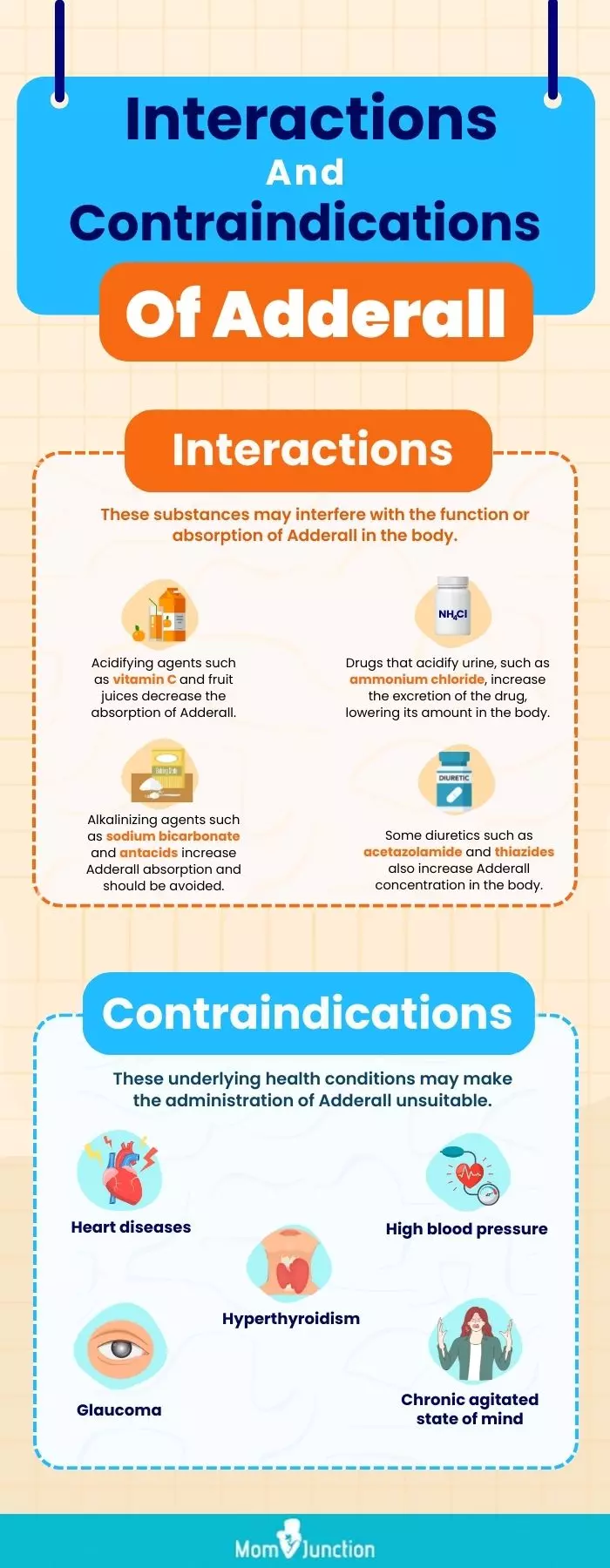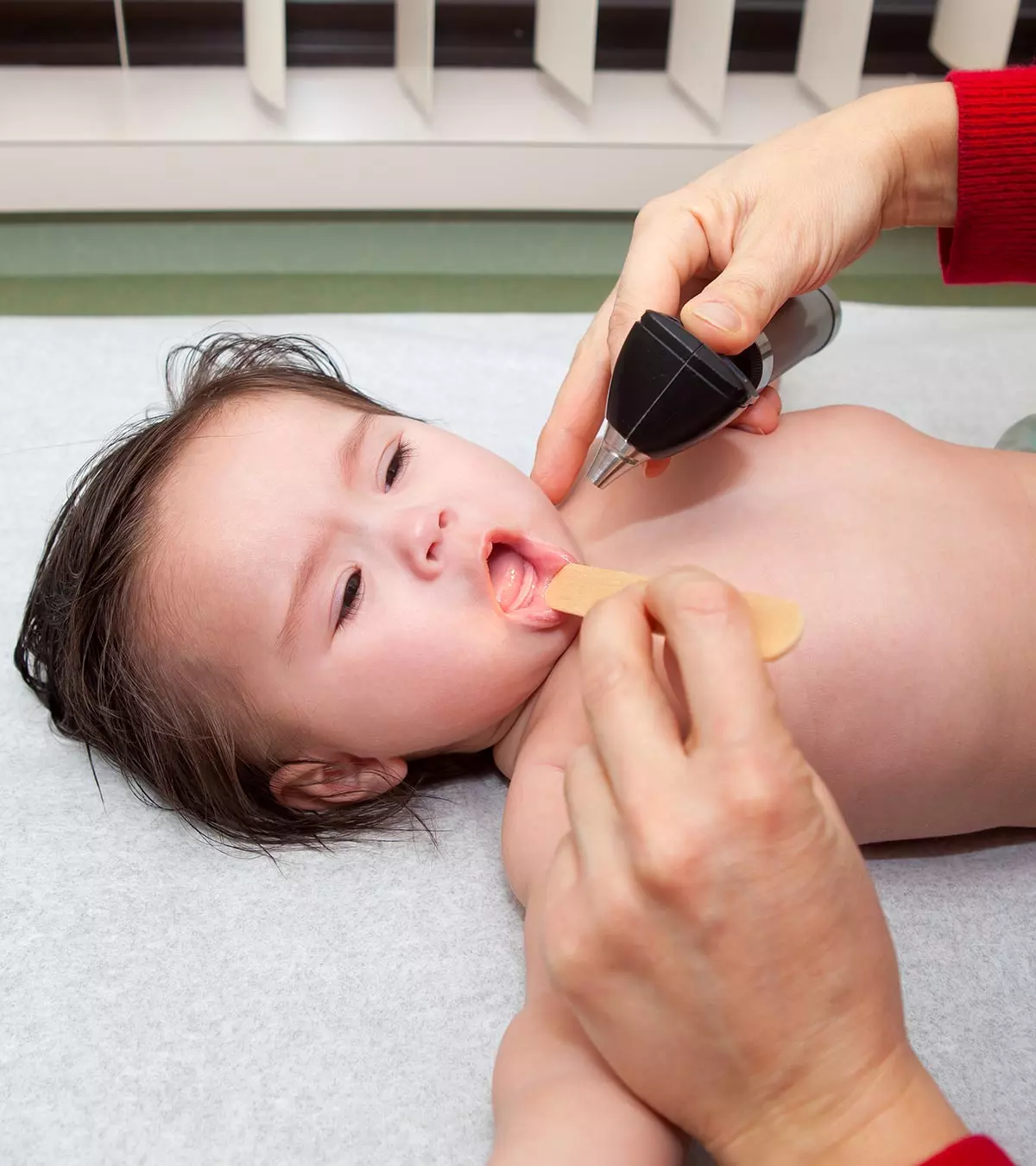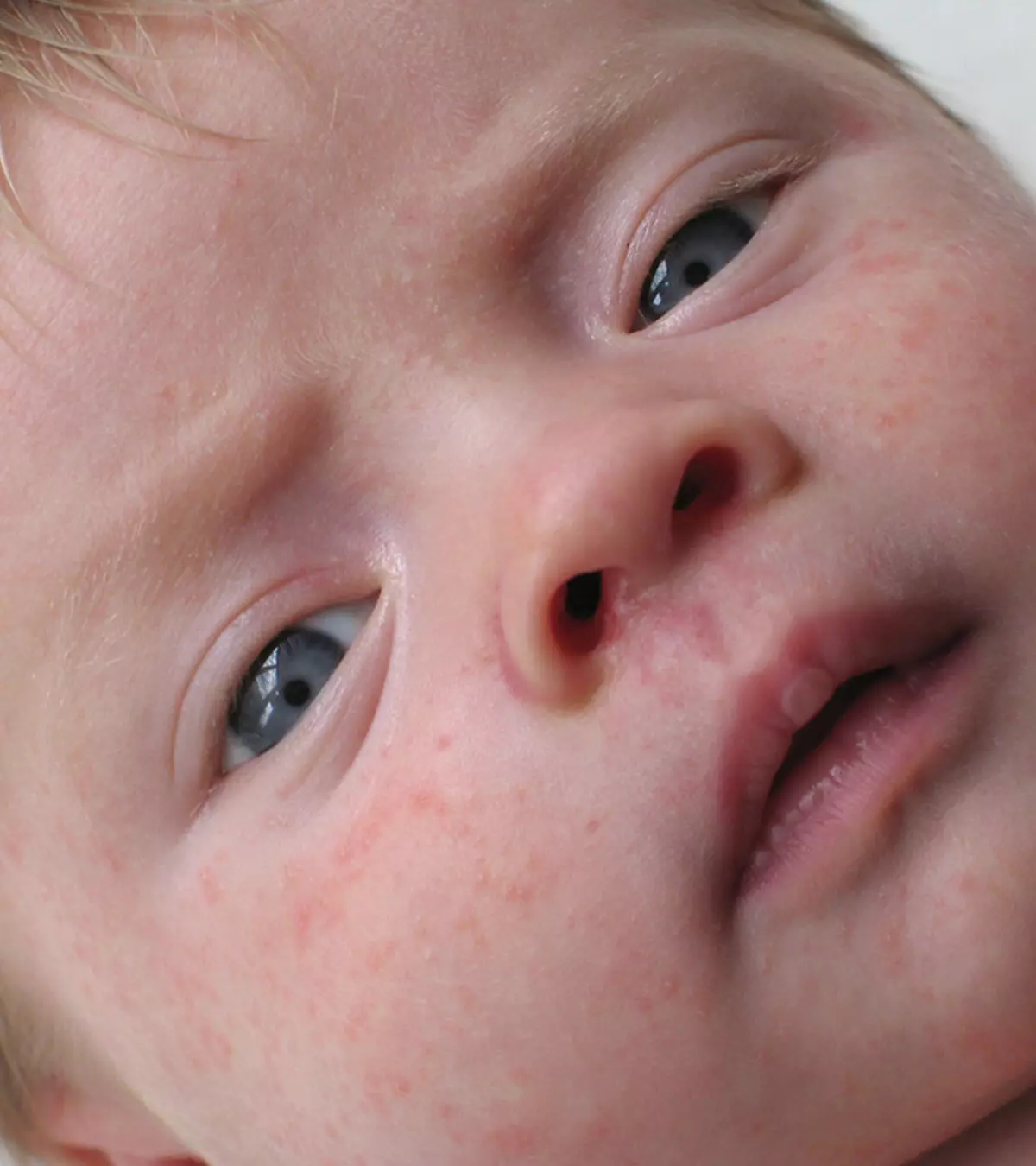
Adderall is a central nervous system stimulant made by combining two drugs — amphetamine and dextroamphetamine. It is a prescription drug used to treat attention deficit/hyperactivity disorder hyperactivity disorderiA neurodevelopmental disorder that mostly begins in early childhood and results in difficulty paying attention and impulsiveness. (ADHD) and narcolepsyiA neurological disorder that affects the sleep-wake cycles in the brain and leads to overwhelming feelings of lethargy and drowsiness. (1). However, many parents may wonder whether it is safe to use Adderall when breastfeeding.
Since some drugs can seep into the breast milk and affect the infant, such concerns are valid and should be addressed before consuming them.
Read this post to learn if it is safe for lactating mothers to use Adderall and the possible side effects of the drug.
Key Pointers
- Adderall is commonly used during breastfeeding to manage symptoms of ADHD.
- However, its safety while breastfeeding has not been established and should only be used under medical supervision.
- Some common side effects of Adderall include dizziness, stomach ache, and nervousness.
- Overdosing on Adderall can lead to seizures.
- Overexposure of babies to Adderall through breast milk may cause symptoms of tachycardia and seizures.
What Is Adderall?

Adderall is a combination of two nervous system stimulant drugs namely amphetamine and dextroamphetamine. It belongs to the central nervous system stimulant drug category. There are several variants of the medicine, including those that release instantly into the system and those that release over an extended duration (Adderall XR). The dosage may differ for each variant.
 Point to consider
Point to considerWhy May A Breastfeeding Mother Need Adderall?
Adderall is prescribed by doctors as an attention-deficit/hyperactivity disorder (ADHD) medication. The compounds amphetamine and dextroamphetamine present in the drug mimic dopamine, epinephrine (also called adrenaline), and norepinephrine, which are naturally occurring neurotransmitters of the body. It is a serotonin, norepinephrine, and dopamine reuptake inhibitor.
Adderall imitates the functions of these compounds and suppresses the symptoms of ADHD, a neurodevelopmental disorder. It makes you more alert, improves clarity of thought, and helps you focus better (2).
Is It Safe To Have Adderall During Breastfeeding?
Dr. Thomas Hale, the author of Medications and Mothers’ Milk, says that clinical doses of dextroamphetamine (one of the drugs in Adderall) is “Probably safe”, but it could be hazardous when abused (3). Although Adderall may be prescribed to breastfeeding mothers, it is important to exercise caution due to limited research on its medication safety and potential effects on newborn health (4)(5).
Lack of enough evidence on the lactation safety of the drug and its potential for abuse prevents several healthcare providers from recommending Adderall. The US FDA recommends mothers taking amphetamines to refrain from breastfeeding (1).
What Are The Side Effects Of Adderall ?
Side effects of Adderall vary from common ones to more serious ones.
Common side effects of Adderall
The common side effects can occur with any dosage of the medicine (1)
- Stomachache
- Decreased appetite
- Dizziness

Serious side effects of Adderall
Severe side effects may usually occur with an overdose or abuse of Adderall (1).
- Seizures in people with a history of seizuresiThe sudden occurrence of abnormal changes in the electrical activity between brain cells that lead to temporary alterations in behavior, consciousness, and memory.
- Eyesight change or blurred vision
- Serotonin syndromei A condition that can be potentially life-threatening and is caused by the intentional or unintentional overdose of medications that increase serotonin levels in one’s body.
Most people who use Adderall for a long time may be able to cope better with some of the side effects over time. However, it is important to consider the physical and psychological effects on the mother and adverse effects on the breastfeeding baby. If you notice any unusual symptoms, inform your doctor.
 Caution
CautionWhat Are The Side Effects Of Adderall On A Breastfeeding Baby?
There isn’t extensive research on how Adderall affects a breastfeeding infant. Amphetamine can get concentrated in breast milk with levels reaching seven times of that found in blood (1). Maternal intake may lead to drug transfer to breast milk, the infant’s blood, and urine too.
A study suggests that a small and standard dosage of Adderall does not usually have any effect on the infant’s development or health (7).
The American Academy of Pediatrics (AAP) Committee reports that animal studies on long-term exposure to amphetamine showed cases of hypertensioniThe condition in which the blood pressure against the walls of the arteries is too high. , tachycardiaiThe rapid beating of the heart, usually measured to be more than 100 beats per minute. , and seizures in babies. Since there are no human studies, the AAP recommends avoiding drugs containing amphetamines during breastfeeding to prevent neonatal drug exposure.
 Quick fact
Quick factWhen Can You Breastfeed After An Adderall Dose?
The mother is recommended to withhold breastfeeding for 24 hours after the Adderall dosage, although some experts suggest waiting up to 48 hours (8) (9). During this time, the mother can express and discard the breast milk for 24-48 hours after dosage to keep up her supply and not get engorged.
Some mothers may wish to avoid Adderall entirely during lactation to prevent the risk of exposure to the baby. However, it puts the mother at risk of a relapse of ADHD symptoms.
You may try these tips, should you decide to avoid Adderall.
- Look for alternatives: Your doctor can prescribe alternatives that are safer than Adderall for your breastfed infant. The choice of alternatives depends on the extent of your condition and your current Adderall dosage.

- Adjust your dose to the bare minimum: If it is imperative to have Adderall, then discuss with your doctor about adjusting the dose to the bare minimum level. It can let you receive the therapeutic advantages of the medicine without causing any adverse effects on maternal health or the health of your breastfeeding baby.
Frequently Asked Questions
1. How often should I take Adderall while breastfeeding?
Breastfeeding women shouldn’t take Adderall unless prescribed by a healthcare provider. If prescribed, the provider will give dosage and frequency instructions. Follow them carefully, and don’t exceed the prescribed dose.
2. Can I take Adderall if I have a history of psychological problems?
Your doctor will take into account your mental health history and prescribe the relevant dosage of the drug or suggest alternatives.
3. Can I take Adderall if I have a history of heart problems?
The prescription of Adderall will depend on several factors, such as the type of heart problem, how long you have had it, and whether you have any medicines for it. Discuss your heart problems with the doctor in detail before having Adderall.
Adderall is a medication for treating ADHD in adults. There is no clear evidence of therapeutic doses of this medicine causing side effects in breastfeeding infants, but taking Adderall when breastfeeding is not recommended. It contains the drug amphetamine, which may reach the infant via breast milk and affect neurotransmitters. Check with your doctor for suggestions on alternatives to Adderall or a dosage modification. Remember that the mother’s health is extremely important for the well-being of the baby. Also, consult your healthcare provider before discontinuing this medication.
This post is for informational purposes only and is not a replacement for a doctor’s consultation. Do not use any medication without talking to your doctor.
Infographic: Who Should Not Be Prescribed The Drug?
Adderall is a stimulant drug used in treating ADHD in adults. Certain substances may increase or decrease the absorption of the drug in the body and subsequently alter its efficacy. The drug may also be unsuitable if some underlying health conditions are present. The infographic below discusses the interactions and contraindications of Adderall. Illustration: Momjunction Design Team
Illustration: Is It Safe To Have Adderall When Breastfeeding?

Image: Dalle E/MomJunction Design Team
Is Adderall safe for consumption when breastfeeding a baby? Learn about the risks of taking Adderall while breastfeeding. Get the facts on how it can affect your baby’s health and development.
References
1. Adderall; U.S. Food & Drug Administration
2. What Does Adderall Do To Your Body?; Texas A&M University
3. Treatment of Attention Hyperactivity Disorder (ADHD); Department Of Health & Human Services; Center For Drug Evaluation and Research
4. Amphetamine; U.S. National Library of Medicine
5. Dextroamphetamine; U.S. National Library of Medicine
6. E. Steiner et al., Amphetamine secretion in breast milk; National Center for Biotechnology Information
7. Amphetamine; Drugs and Lactation Database; NCBI
8. Alcohol and drug use while breastfeeding; Department of Health, Govt. of Western Australia
9. A. Bartu et al.; Transfer of methylamphetamine and amphetamine into breast milk following recreational use of methylamphetamine; National Center for Biotechnology Information
10. Dextroamphetamine; Mother To Baby
11. Breastfeeding Safety: Stimulants; UT Health Austin
Community Experiences
Join the conversation and become a part of our nurturing community! Share your stories, experiences, and insights to connect with fellow parents.
Read full bio of Mindy Cockeram
Read full bio of shreeja pillai
Read full bio of Rohit Garoo
Read full bio of Vidya Tadapatri























